SAC 3A
1/89
There's no tags or description
Looks like no tags are added yet.
Name | Mastery | Learn | Test | Matching | Spaced |
|---|
No study sessions yet.
90 Terms
Democracy
a system of government for the people in which representatives are elected by the people
Representative democracy
the Australian people vote in elections to chose politicians that will create laws and make decisions on their behalf.
Bicameral
a parliament that has two houses or chambers
Federal Parliament - lower & upper house
lower house - house of representatives
150 members
upper house - the senate
76 members (12 per state, 2 per territory)
how are laws passed
bill is debated & voted on in lower house
bill is debated & voted on in upper house
royal assent by crown
bill becomes law
roles of house of represenatatives
initiate and make law
determine the govt
act as a house of review
control govt expenditure
represent the people
scrutinise govt administration
HOR - initiate and make law
•The main function of the lower house is to initiate new laws by introducing bills.
•The process of initiating, debating and voting on proposed laws is a long and considered process.
•Bills passed by the lower house will then be considered by the Senate.
HOR - determine the govt
Following an election, the political party (or coalition of parties) that holds a majority of seats (i.e., at least 76 of 150) in the House of Representatives will form majority government.
Alternatively, if neither party reaches this majority, the political party that can form a minority government with the support of the independents and/or minor parties (e.g., Greens).
HOR - act as a house of review
If a bill has been initiated and passed through the Senate, the House of Representatives will be the ‘second house’ to consider whether the bill should become law, and will therefore act as a house of review.
HOR - control government expenditure
A bill must be passed through both houses of parliament before a government can collect taxes or spend money, but only the House of Representatives can introduce money bills.
HOR - represent the people
Members are elected to represent the people on their behalf, and proposed laws should therefore reflect the views and values of the majority of the electorate that the member represents.
HOR - scrutinise govt administration
Ministers must be members of parliament and are expected to be answerable and accountable for their decisions, policies and actions.
One way this is upheld is during question time in parliament, where members can question ministers about their policies and legislative mandate.
This is called responsible government
roles of the senate
act as a house of review
allow for equal rep of the states
initiate bills
scrutinise bills & govt administration
senate - act as a house of review
Most bills are initiated in the lower house, so the Senate reviews the bills that have been initiated and already passed through the House of Representatives.
The Senate may pass a bill without amendments, pass it with amendments (or, in the case of a money bill, request that the lower house amends it before passing), or reject it.
The Senate can therefore act as an important check on government in law-making, particularly if the government does not have a majority in the Senate.
senate - allow for equal rep of states
The senate is known as the ‘states house’.
Section 7 of the Constitution provides that the Senate should have an equal representation from each state, regardless of its size and population, to protect the interests of the states (particularly smaller ones).
senate - initiate bills
Similar to the House of Representatives, the Senate can also initiate bills (other than money bills).
Although most bills are initiated in the House of Representatives, a bill may be introduced in the Senate when, for example, a minister is a senator and is in charge of a bill.
senate scrutinise bills & government administration
The Senate has a number of committees that can scrutinise legislation or particular government activities, legislation or policy, as well as government expenditure.
This includes the Senate Standing Committee for the Scrutiny of Bills, whose role is to assess legislative proposals to determine what effect the proposals would have on individual rights, freedoms and obligations, as well as the rule of law.
Victorian Parliament - upper & lower houses
lower house - legislative assembly
upper house - legislative council
roles of LA
initiate and make law
determine the government
scrutinise government administration
control govt expenditure
represent the people
act as a house of review
roles of LC
act as a house of review
initiate bills
scrutinise government administration
The crown is represented by
one Governor General (federal)
6 governors (state)
roles of the crown
granting royal assent
withholding royal assent
appointing the executive council
crown - granting royal assent
The Crown’s representative (the Governor-General or state governor) is required to approve bills before they can become law.
This is known as royal assent.
Royal assent is normally granted on the advice of the Prime Minister or ministers at the Commonwealth level, and on the advice of the Premier of Victoria or ministers at the Victorian level.
crown - withholding royal assent
The Crown’s representative has the power to withhold royal assent (that is, refuse to approve a bill in order to make it an Act of Parliament).
In reality, this has rarely occured, and the ordinary course is that the Crown’s representative will approve bills on advice of the Prime Minister, Premier or ministers.
For example, some of the circumstances in which the Governor-General may withhold royal assent is because:
They are of the view that a bill is unconstitutional
The bill was improperly passed by parliament
crown - appointing the executive council
The role of the Executive Council is to give advice to the Crown’s representative on matters such as whether to approve regulations.
For example, the Environment Protection Amendment (Banning Single-Use Plastic Items) Regulations 2022 (Vic) was made under the advice of the Executive Council.
executive council
a group consisting of the prime minister and senior ministers (at the Commonwealth level) or premier and senior ministers (at the state level) that is responsible for administering and implementing the law by giving advice about the government and government departments
royal assent
the formal signing and approval of a bill by the Governor-General or the governor, after which the bill becomes an Act of Parliament.
residual powers
law-making powers that are not listed in the Constitution (i.e., not specific powers) and are therefore retained by the states. (‘left over’/out of the Constitution)
environment
criminal law
public transport
medical procedures
education
road laws
concurrent powers
law-making powers that are listed in the Constitution and are shared between the Commonwealth and the states.
trade
taxation
marriage & divorce
exclusive powers
law-making powers that are listed in the Constitution that solely belong to the Commonwealth, and cannot be legislated on by the states.
immigration & citizenship
customs and border protection
currency
defence
section 109
when a law of a State is inconsistent with a law of the Commonwealth, the latter shall prevail, and the former shall, to the extent of the inconsistency, be invalid
significance of s.109
provides a mechanism to resolve conflicts between Commonwealth and state laws
where a conflict between a state and Commonwealth law arises, the Commonwealth law overrides the state law
acts as a restriction state parliament law-making abilities - deter states from legislating on already legislated areas
federal & state law can exist without conflict
only invalidates the state law to the extent it is inconsistent with the Commonwealth law
state law not automatically deemed invalid - must be challenged in federal or high court
s.109 does not completely diminish state’s powers - can still pass laws in residual and concurrent areas
if Cth law is abrogated & amended, state law will revive & be in force again
McBain case - McBain v Victoria (2000)
the marriage requirement for IVF imposed by Victoria (Infertility Treatment Act 1995 (Vic)) which meant only women who lived with a man could access IVF conflicted with the Cth Sex Discrimination Act 1984 which argued that a person could not be discriminated against on the basis of sex or relationship status
when challenged in the federal court, this triggered the operation of s.109, which deemed the state law invalid to the extent of the inconsistency
external affairs power
used as a ‘head of power’ by the Commonwealth to make laws in relation to matters that are ‘external’ to Australia, or in relation to matters of ‘international concern’. This includes passing domestic laws that give effect to international treaties.
ultra vires
Latin for ‘beyond the powers’
If the High Court finds that a parliament has made a law beyond its constitutional powers, this is called acting ultra vires.
In such cases, the High Court can declare the law invalid and strike it down, meaning it has no legal effect.
international treaties
a binding agreement between two or more countries that is governed by international law
negotiated and signed to by the executive arm - reflective the intentions of a the party of the govt & ratified by the executive
process of treaty-making
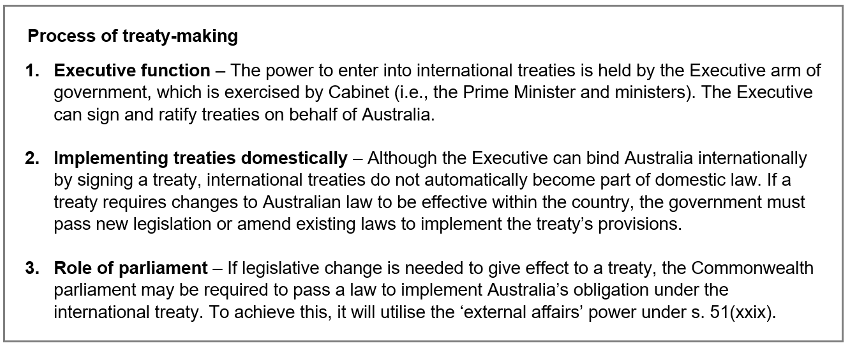
Tasmanian Dam Case facts
the Tasmanian Government proposed building a hydroelectric dam on the Franklin River, a site of significant environmental and cultural importance.
The federal government passed the World Heritage Properties Conservation Act 1983 to stop the dam, aiming to protect the area listed under the UNESCO World Heritage Convention.
Tasmania challenged the law, arguing that the Commonwealth was interfering in an area of residual (state) power—land management.
The matter was taken to the High Court, which had to determine whether the Commonwealth’s law was valid under the external affairs power (Section 51(xxix)) of the Constitution.
interpreted section 109 as the constitutional external affairs power prevailed over state law
the High Court ruled in favour of the Commonwealth.
Tasmanian Dam case significance
allows Commonweatlh to bypass its consitutional restriction from passing laws in residual areas & intervene in a state matter
ruling expanded the scope of the Commonwealth’s law-making power, allowing it to pass legislation to implement international treaties, even when the subject matter (like the environment) is not a listed power in the Constitution.
The case shifted the balance of power more towards the Commonwealth, showing it can use the external affairs power to intervene in areas of state responsibility.
may allow Commonwealth to acquire unlimited legislative power
limitations of external affairs power
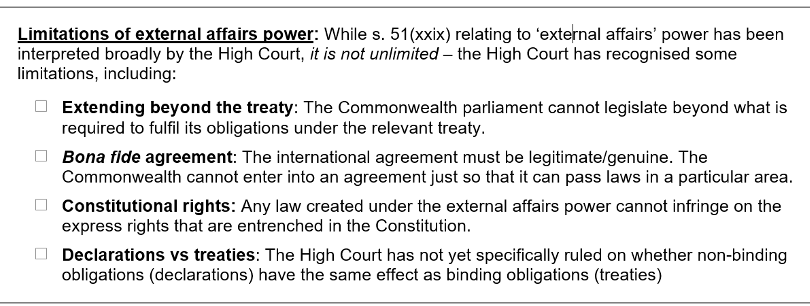
hostile upper house
if there is no government majority in the upper house (i.e. it has a minority of seats), legislation may be more readily amended or rejected by those who have the balance of power, possibly for political gain
rubber stamp upper house
If the government has a majority of members in the upper house, they simply confirm decisions made by the lower house without real review or debate.
rubber stamp upper house - advantages & disadvantages
advantage
The government can pass laws quickly and efficiently.
it can implement its full legislative agenda, which it was elected to deliver – i.e., the Australian people has given it a clear mandate through the election.
disadvantage
Reduces the Senate’s role as a ‘house of review’, and there is less debate or scrutiny of bills.
Party loyalty may override what’s best for the broader community – and members of the upper house may vote for bills even if they are not in the interests of the majority of the community.
Private members’ bills (non-government bills) may be rejected without debate
48th Cth Parliament - balance of power
likely with crossbench
government will need support of either the opposition or some or all of the crossbenchers to get bills passed through the upper house
hostile upper house advantage & disadvantage
advantage
more thorough debate and scrutiny of bills
disadvantage
the government can face difficulties implementing its legislative policy agenda, because the crossbench can force the government to make changes (amendments) to their bills or can reject government bills entirely by voting with the opposition
diverse upper house advantage & disadvantage
advantage
can be seen as an opportunity for more effective law-making (e.g., Greens, One Nation, independents, etc.)
The government may be forced to consider a wider range of views and, in the process, laws better reflect community interests.
disadvantage
can allow a small group of independent members or members of a minor party to hold a disproportionately high level of power compared to the size of their voter base
sitting days
On a “sitting day”, members meet at parliament house, and it is only then that bills can be debated and passed.
For example, the House of Representatives sat for 64 days in 2022, and the Senate sat 51 days.
the limited number of sitting days has been criticised by some as a ‘waste of time’, on the grounds that it reduces the time and opportunities to pass important legislation.
bicameral structure: quality control

bicameral structure: thorough process


international pressures
are demands or forces applied to parliaments to persuade them to make (or not make) law to address matters of international concern
issues of global concern examples
The increased challenges of climate change, including the pressure to reduce greenhouse gas emissions
The need to protect the rights of vulnerable or minority groups, including asylum seekers, First Peoples, young people and the LGBTQIA+ community
Increasing the age of criminal responsibility
Addressing global pandemics, natural disasters and wars
sources of international political pressure
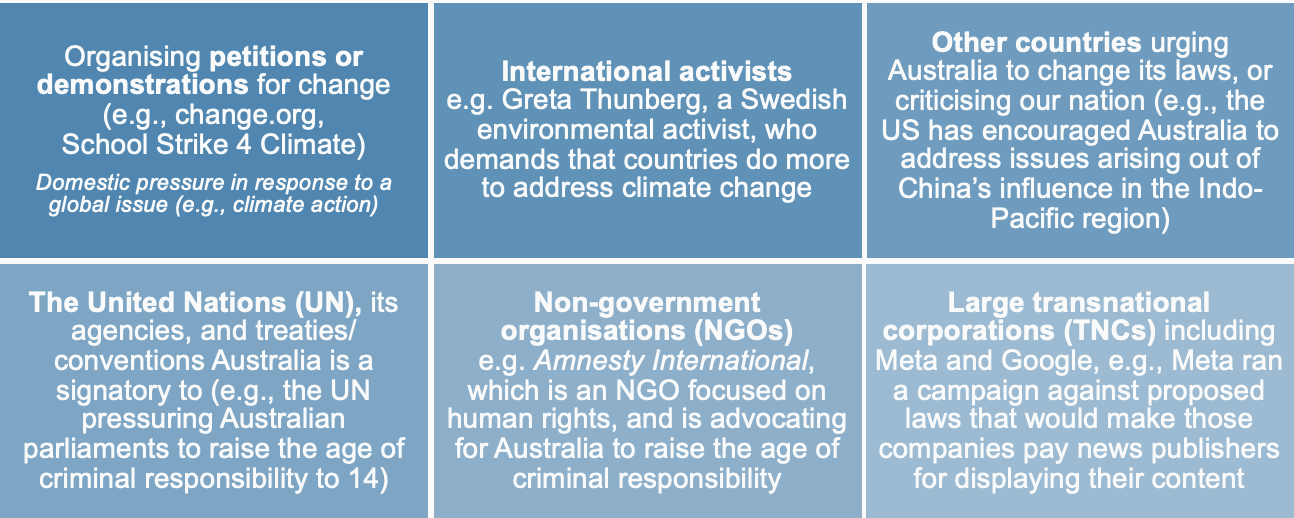
Raise the age of criminal responsibility
The age of criminal responsibility is the age at which a child is deemed to be capable of forming the intention to commit an offence under criminal law, and therefore can be found guilty of committing a crime.

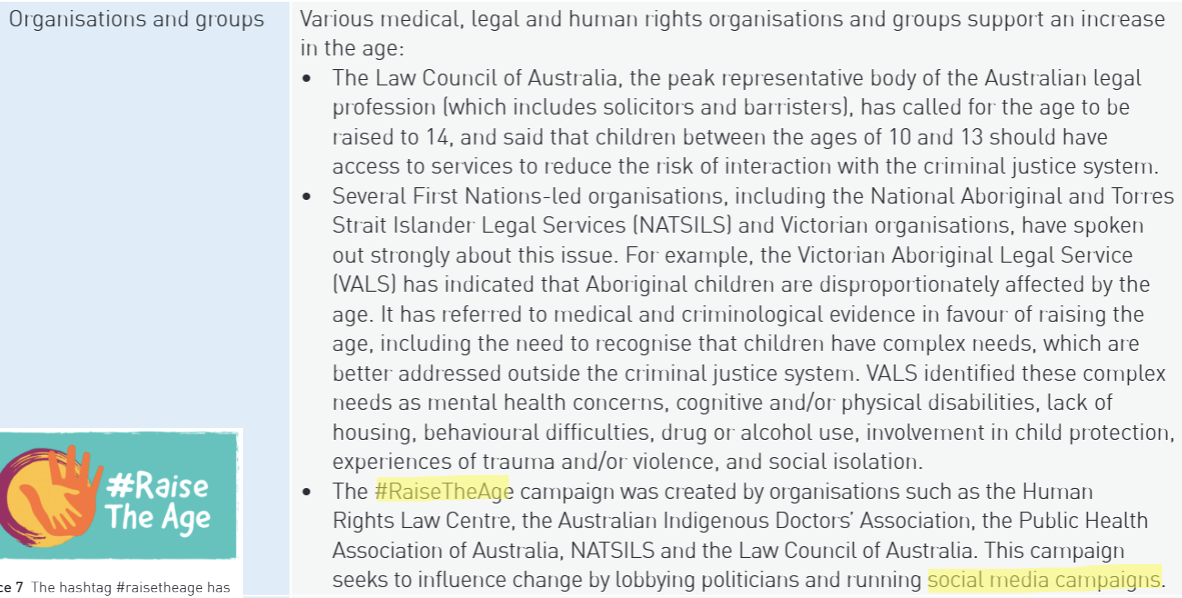
discussion points of international pressures
depends on domestic will - if the views & values of Australian people conflict with global pressures the govt will prioritise domestic interests as they want to be re-elected (competing interests)
Australia is a part of the global community and will act to maintain their reputation on the world stage
maintaining relationships with groups like the UN or upholding international treaties
if global issues are valued domestically, failure to legislate may lead to being voted out
representative nature of parliament as a factor
Australia's parliamentary system is expected to be representative of the people . If they fail to make laws that reflect the views and values of the people, they will jeopardise their chance of being re-elected
diversity of parliament - discussion
the parliament does not reflect the broader make up of our communities
while female representation is increasing, the number of First Nations member of parliament are below the general population
some argue that this means some groups and their interests aren't well represented
some argue that the diversity of parliaments does not affect their ability to represent people in parliament as there are means by which members of parliament can understand the needs of the community:
can communicate through petitions and demonstrations
can rely on formal law reform bodies to gauge the views of communities to help ensure those views are represented in law making
rep nature - willingness to act in accordance with the majority (discussion)
representative nature encourages members of parliament to listen to the views of the community and make laws in accordance with these views
in an attempt to be re-elected, members of parliament may introduce and support laws that are popular with voters rather than passing laws that may be necessary but unpopular with voters
eg. governments may promote tax cuts to win the support of voters when it may not necessarily be in the best interests of the country.
rep nature - regular elections
Federal Elections - every 3 years (no fixed date)
State Elections - every 4 years (fixed term)
Federal: govt can call election whenever they like which can allow them to control votes
State: 4 year terms ensure govt implements longer-term bills that will genuinely benefit Australians
role of the high court
high court established under section 71 of Aus Constitution
section 76 gives the High Court the power to hear disputes arising under the Constitution or involving its interpretation
cannot change (remove/add) words of the constitution, but it can interpret the meaning
representative govt - constitution sections
Section 7 requires that senators must be “directly chosen by the people of the state”.
Section 24 requires members of the House of Representatives to be “directly chosen by the people of the Commonwealth”.
Roach Case background
In 2006, the Commonwealth Parliament passed legislation which banned all convicted and sentenced prisoners from voting in elections.
previous act in 2004 meant prisoners who were serving sentences longer than three years were banned from voting
Roach challenged the validity of the acts in the High Court
Roach Case significance
High Court held that the 2006 Act was inconsistent with the system of representative democracy established by the Constitution
infringed on section 7 & 24 which require parliament to be chosen directly by the people
commonwealth can only restrict the right to vote for a ‘substantial reason’ (committed treason, prisoners more than 3 yrs, unsound mind)
HC ruled that while the 2004 legislation was valid, it was unconstitutional for all sentenced prisoners to be denied the right to vote
High Court - protecting freedom of political communication
The Australian Capital Television v Commonwealth case dealt with Commonwealth legislation that banned all political advertising on radio and television during election periods (the Political Broadcasts and Political Disclosures Act 1991 (Cth)).
This legislation allowed some free advertising to those political parties that already had members of parliament.
However, it did not allow either free or paid time on television and radio to anyone else who had a political comment they wanted publicised.
The High Court held that the legislation was invalid because it overrode an implied constitutional right – freedom of political communication.
implied rights
rights that are not expressly stated in the Constitution but are considered to exist through interpretation by the High Court
strengths of high court - rep govt
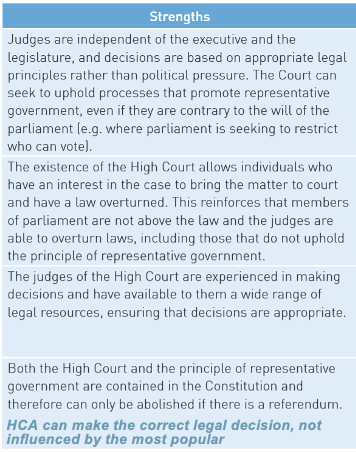
weaknesses of high court - rep govt
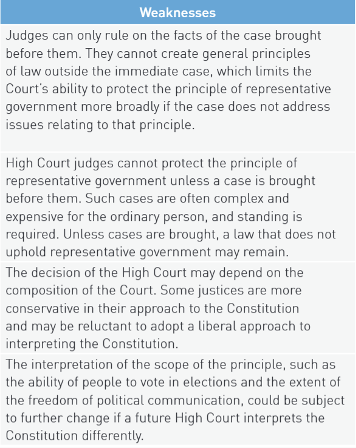
Lange case
affirmed the freedom of political communication
exists by s7 & 24
prevents us being exposed to laws which prohibit communication on politics
laws cannot impede on right to free political communication
separation of powers
a doctrine established by the Australian Constitution that ensures the three powers of our parliamentary system remain separate
ensures no one body has absolute power
executive power
the power to administer the laws and manage the business of government which is vested in the Governor-General as the King’s representative
section 61 states that the executive power is vested in the queen BUT in practise, this is carried out by the prime minister, senior ministers and govt departments
legislative power
the power to make laws, which resides with parliament
judicial power
the power given to courts and tribunals to enforce the law and settle disputes
s.71 - the judicial power of the Cth shall be vested in the courts
overlap between legislative and executive
legislative and executive are combined
cabinet are in executive and legislative
importance of separating legislative and judicial
only a court or tribunal has the power to decide if a law has be contravened
it is role of the High Court to decide disputes on issues involving the constitution although, as a secondary role, the courts have the power to make common law (NZYQ case)
this safeguards citizens against misuse political power or corruption in the resolution
state and federal judges appoint judges
importance of separation of powers
prevents the power to control the law being concentrated in one branch/arm/function
helps protect individual rights by providing checks and balances of the law-making of Commonwealth parliament
no one has ‘absolute power’
strengths of separation of powers
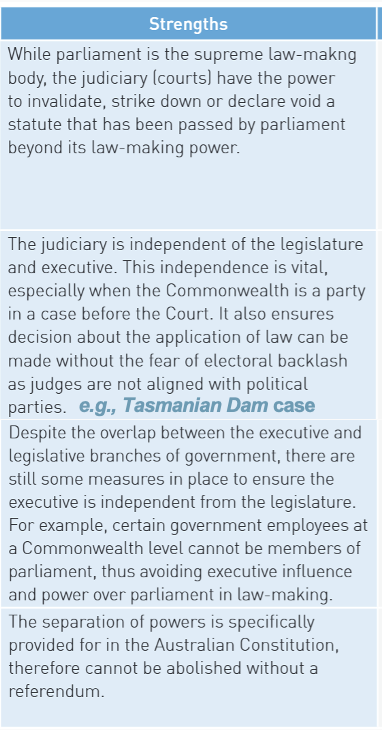
weakness of separation of powers
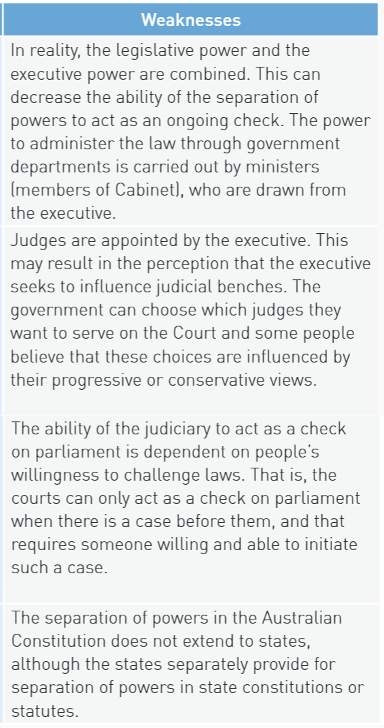
NZYQ v Minister for Immigration… (2023) background
plaintiff (NZYQ) was a stateless refugee born in myanmar
in 2012 - arrived in Aus, was kept in immigration detention until 2014
in 2016 NZYQ pleaded guilty to a sexual offence against a child and was sentenced to 5 years imprisonment
upon release, NZYQ returned to immigration detention while the govt examined ways of sending him overseas
NZYQ case findings/significance
High Court determined that if the purpose of detaining a non citizen is:
administrative - preparing non-citizen for deportation, or to get a visa = LAWFUL
punishment - indefinite detention, where realistic removal is not a prospect = UNLAWFUL as it breaches the separation of powers (unconstitutional)
express right
rights that are stated in the Australian Constitution
5 express rights
right to freedom of religion
right to free interstate trade and commerce
right to receive just terms when property is acquired by the Commonwealth
right to trial by jury for indictable Commonwealth offences
right not to be discriminated against on the basis of the state where you reside
express rights - religion
section 116 - commonwealth parliament cannot make a law which
establishes a state religion
imposes religious observance
prohibits the free exercise of any religion
requires a religious test as a requirement for holding any cth office
Williams v Commonwealth (2012) facts
Williams challenged the Cth Govt’s power to fund a chaplaincy service running in a govt primary school
the Cth Govt entered into a funding agreement with Scripture Union Queensland to provide chaplaincy services
Williams argued the funding agreement was invalid because it was beyond the executive power of the Commonweahtlh (s61) and prohibited by s.116
the challenge relating to s116 was dismissed bc chaplains were not employees of the commonwealth
Williams v Commonwealth (2012) decision
HC found that s61 did not empower the Cth to enter into a funding agreement - as there was no act to give authority to the funding agreement, it was deemed invalid
then, parliament passed legislation to allow the chaplaincy program to be funded by Cth
HC found in favour of Williams, declaring that the agreement was invalid in relation to the school because they had no legislation to support this
express right - trade within the cth
section 92
on the imposition of uniform duties of customs, trade and commerce, and intercourse among the states… shall be absolutely free
express right - acquisition of property on just terms
section 51 (xxxi)
the commonwealth must pay fair and reasonable compensation for property that is compulsorily acquired
both intangible and tangible property
can only acquire land for a purpose where they have power to make laws
express right - trial by jury
section 80
must be a jury trial for indictable commonwealth offences under the criminal law
Alqudsi v The Queen 2016
Alqudsi was charged under commonwealth law for terrorism-related charges
Alqudsi put forward a motion to be heard by a judge only
Alqudsi was unsuccessful as he was required by section 80 to be heard by a jury
express right - discrimination on the basis of state residence
s.117
unlawful for state and cth governments to discriminate against someone based off their state of residence
eg. a resident of NSW living in Victoria cannot be subject to a Victorian law that would put them in a worse position than if they were born in Victoria
strengths of express rights as a check on parliament
express rights impose limits on parliament when making law - eg. prohibits the Cth parliament from making law that restricts the free exercise of religion
express rights are entrenched and thus can only be changed by referendum
the High Court can act swiftly in declaring a law to be ultra vires and invalid
High Court is independent and will make decisions protecting express rights even if they are contrary to govt’s beliefs
weaknesses of express rights as a check on parliament
rights are limited in scope - limits the restrictions on parliament
express rights have not been added to or amended since Federation bc referendums are so hard to pass'
a case must be brought to the High Court for them to make any ruling on the protection of express rights - also time consuming and expensive
express protection of rights does not stop a law being passed as the law must be challenged in court for it to be deemed invalid